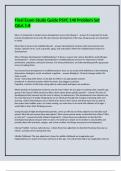Final Exam Study Guide PSYC 140 Problem Set
Q&A 1-8
Why is it important to study human development across the lifespan? - answer-It is important to study
human development across the life span because development is life long. All age groups are important
to study.
What does it mean to be multidirectional? - answer-Development involves both improvement and
decline. Specific terms, such as growth, aging, and maturation reflect the multidirectional nature of
development.
Why is lifespan development multidisciplinary? Is there a reason why various disciplines study lifespan
development? - answer-Lifespan development is multidisciplinary because it's important to health
professions, education, and social sciences. For these professions, an understanding specific age groups
is key to helping them.
You learned how development is multidimensional. Now, try to create brief definitions of the following
dimensions: biological, social, emotional, cognitive. - answer-Biological - Physical changes within the
body as well.
Social - interacting with others, to be able to reflect in an appropriate manner.
Emotional- A chemical reaction within the brain, that triggers reactions.
Cognitive- Function of the brain, being able to understand and figure out problems.
Which periods of development interest you the most? Why? Do you plan on working with a specific age
group in the future? What would you like to learn about these specific periods? - answer-The area of
development that interests me the most is infancy to adolescence. This development area interests me
the most because it is pretty intriguing to see an infant go through the changes of growing older and
learning. I find it interesting to see an infant learn how to form words and then learn how to walk as
they enter their toddler years. As I enter nursing, my main focus is to work with children of all ages. I
would like to learn their thinking process.
Going through all eight developmental periods, come up with two to three adjectives to describe each
period. Why did you choose these descriptors? Were some periods easier to describe than others? Why,
or why not? - answer-Prenatal: Reliant, Dependent. I chose these two adjectives to describe this
developmental phase because when in utero, the embryo is reliant on its mother to stay healthy and
provide them with nutrients, oxygen, and a host of other vital things necessary for development.
Infancy/Toddler: Curious, Adventurous. I chose these two adjectives to describe this phase because an
infant's curiosity sets in during this time.
Middle Childhood: The two adjectives I chose for middle childhood are Imaginative and
Independence.As I watch my 6-year-old niece at this age, I've noticed how big of an imagination she has.
, Adolescence: The two adjectives I chose to describe adolescence are, Pubertal and Sociable. Around this
stage in development, teens experience puberty. Their bodies start to change physically. They're able to
reproduce offspring.
Early Adulthood: The two adjectives I chose to describe early adulthood are motivated and determined.
Speaking from my own perspective, as I entered early adulthood I was motivated to start college and get
to get my first job. I was determined to earn my degree and to find my own place.
Middle Adulthood: Independent, Responsible. When people reach middle adulthood, they're fully
independent. Living on their own, handling their responsibilities, such as rent/mortgage, bills, and
children.
Late Adulthood: Aging, Dependent. Entering late adulthood starts the process of aging. Aging sometimes
comes with sicknesses that often lead to an individual becoming dependent on others to take care of
them.
Some periods were easier to describe more than others because I was able to explain them from my
own point of view
Summarize each side of the nature/nurture controversy. Then, go through the first four theorists in this
module (Freud, Erikson, Skinner, and Piaget) and consider whether each theorist leans toward the
nature or the nurture side. - answer-Nature is said to be influenced by genetics and other biological
factors. Whereas nurture is said to be influenced by life experiences, social influences, and an
individual's upbringing.
Freud leans toward nurture.
Erikson leans towards nurture.
Piaget leans toward nature
Skinner leans toward nurture.
Summarize each side of the continuity/discontinuity controversy. Which theorists (consider Freud,
Erikson, Skinner, and Piaget) view development as being discontinuous? - answer-Continuity and
Discontinuity both have to do with the process of change.
Continuity various stages of development gradually flows.
Discontinuos, stages are distinct, one ends before the other. Freud, Erikson and Piaget view
develolpment as discontinous, Behaviorist are being continous.
Compare and contrast the following three theorists regarding their stage theories and view of human
development: Freud, Piaget, Erikson. - answer-Stage theorists Freud, Erikson, and Piaget view
development as discontinuous. Erikson and Freud lean toward nurture, while Piaget leans toward nature
and focuses primarily on cognitive development. and childhood, Freud emphasizes psychosexual
development, childhood, and adolescence. Erikson covers infancy through adulthood and incorporates
social development.
Compose four sentences to summarize the following theories: information-processing, sociocultural,
ecological. - answer-Informational processing likens the human brain to a computer.
Sociocultural focuses on change in behavior.
Ecological development focuses on environmental development.





